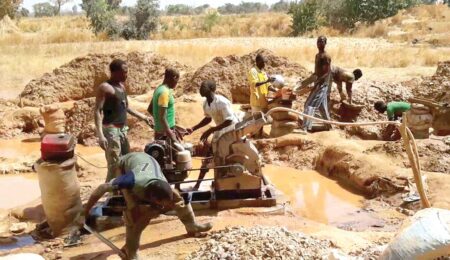Nigeria’s solid minerals sector has experienced a remarkable transformation under President Tinubu’s administration, with reforms driving a six-fold increase in revenue and attracting over $800 million in foreign investments, the Minister of Solid Minerals Development, Dr Dele Alake, has disclosed. These impressive figures come despite the sector receiving only 18% of its ₦29 billion budget allocation in 2024.
Speaking in an exclusive interview for an upcoming State House documentary commemorating President Tinubu’s second anniversary, Dr Alake highlighted that the government’s policies prioritising local value addition and stricter licensing requirements have spurred significant investor interest. Key projects include a $600 million lithium processing plant near the Kaduna-Niger border, scheduled for commissioning this quarter, and a $200 million lithium refinery near Abuja nearing completion. Additionally, two processing plants in Nasarawa are expected to be operational before the third quarter of 2025.
Dr Alake emphasised that the administration has ended the practice of exporting raw minerals by insisting that mining licences are granted only to companies with local processing facilities. “When we took office, the sector’s annual revenue was ₦6 billion; by the end of last year, it rose to ₦38 billion, all with just 18% of our budget released. This demonstrates the effectiveness of our reforms,” he explained.
In the first quarter of 2025, the Mining Cadastral Office and the Mines Inspectorate generated ₦6.9 billion and ₦7 billion respectively, signalling a record-breaking year ahead. The current budget includes ₦1 trillion for mineral exploration aimed at producing internationally certified geological data, an area Nigeria had previously neglected compared to other African nations.

“Exploration is key. When we came in, Nigeria had spent just $2 million on exploration, compared to $40 million in Sierra Leone, $148 million in Côte d’Ivoire, and over $300 million in South Africa. No serious investor will touch your sector without credible data,” Dr. Alake stated.
The minister further outlined the administration’s efforts to tackle illegal mining and formalise artisanal miners through enforcement and cooperative structures. Over 300 illegal miners were apprehended last year, with ongoing prosecutions and nine convictions secured, including some foreign nationals. Meanwhile, more than 250 mining cooperatives have been established nationwide to integrate informal miners into the formal economy.
On the international stage, Nigeria now chairs the African Mineral Strategy Group, promoting local beneficiation and equitable mineral trade across the continent. This leadership role emerged from Nigeria’s participation in the 2024 Future Minerals Conference in Riyadh, reflecting the country’s commitment to ending raw material exports without domestic processing.
Investor confidence has soared, with officials from the UK, US, Saudi Arabia, and UAE showing keen interest in Nigeria’s lithium and other critical minerals. Dr Alake revealed that the former British Deputy Prime Minister invited him to Downing Street to discuss British investments, while the US seeks to diversify supply chains away from China.
With growing revenues, foreign direct investment, tighter regulation, and a clear industrialisation path, the solid minerals sector is now a cornerstone of President Tinubu’s economic diversification strategy. The Mining Cadastral Office alone received over 10,000 licence applications in the latest quarter, underscoring the sector’s unprecedented vibrancy.
“Nigeria has not had it this good in the solid minerals sector. We’re restoring confidence, building data, enforcing the law, and returning value to Nigerians from their resources,” Dr. Alake concluded.





Leave a Reply